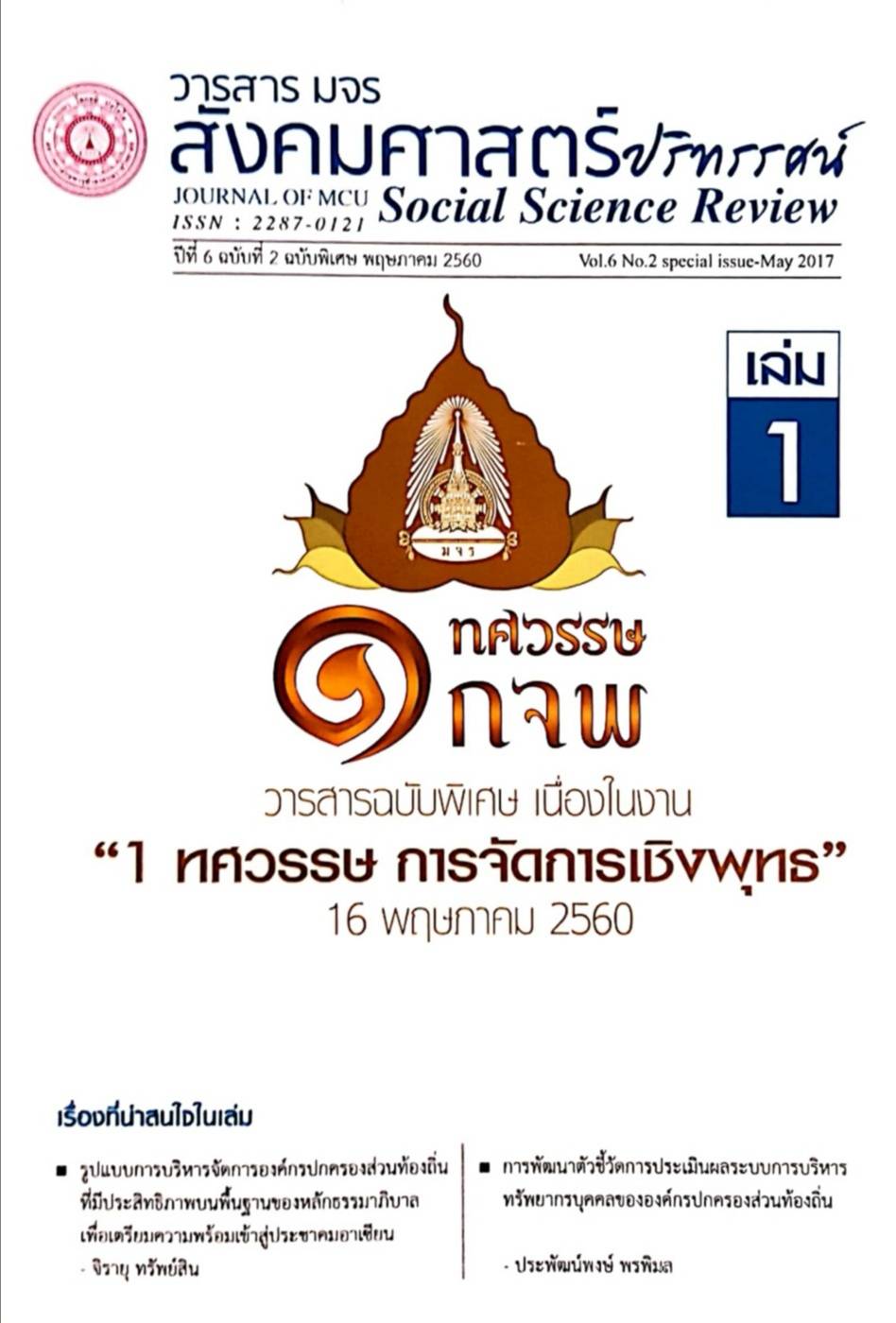แนวทางการเสริมสร้างประสิทธิภาพและปัจจัยแวดล้อมที่เอื้อต่อ การปฏิบัติหน้าที่ของพระอุปัชฌาย์
คำสำคัญ:
แนวทางการเสริมสร้างประสิทธิภาพ, ปัจจัยแวดล้อมที่เอื้อต่อการปฏิบัติหน้าที่, พระ อุปัชฌาย์บทคัดย่อ
บทความวิจัยฉบับนี้มีวัตถุประสงค์ในการวิจัยดังนี้ 1) เพื่อศึกษาการปฏิบัติหน้าที่ของพระ
อุปัชฌาย์ในพระพุทธศาสนา 2) เพื่อศึกษาสภาพปัญหาและอุปสรรคในการปฏิบัติหน้าที่ของพระ
อุปัชฌาย์ในจังหวัดนครราชสีมา และ 3) เพื่อศึกษาแนวทางการเสริมสร้างประสิทธิภาพ และปัจจัย
แวดล้อมที่เอื้อต่อการปฏิบัติหน้าที่ของพระอุปัชฌาย์ การวิจัยครั้งนี้เป็นการวิจัยคุณภาพ ศึกษาจาก
เอกสาร และวิจัยภาคสนามด้วยการสัมภาษณ์ สนทนากลุ่มเป้าหมาย จานวน 43 รูป/คน แล้วทา
การวิเคราะห์ข้อมูล และนาเสนอผลการวิจัย โดยการพรรณนา ผลวิจัยพบว่า พระอุปัชฌาย์ต้องให้
การอุปสมบทถูกต้องตามพระธรรมวินัย และกฎระเบียบมหาเถรสมาคม เมื่ออุปสมบทแล้ว ต้อง
อบรมดูแลสัทธิวิหาริก การปฏิบัติหน้าที่ของพระอุปัชฌาย์ต้องมีความเข้าใจเขต จริยา การละเมิดจริยา
และการระงับการปฏิบัติหน้าที่ และวิธีประณามสัทธิวิหาริก ปัจจุบันสภาพสังคมมีการเปลี่ยนแปลง
ไป ทาให้มีปัญหาเพิ่มขึ้น การคัดสรรกุลบุตรที่จะเข้ามาบวช ไม่ชัดเจนทาให้กุลบุตรที่จะบวชท่องคา
ขานนาคไม่ได้ พิธีกรรมที่ยังไม่ถูกต้อง หลังจากบวชแล้วพระอุปัชฌาย์ไม่มีเวลาอบรมดูแลให้
การศึกษาแก่สัทธิวิหาริก ซึ่งมอบหมายให้เจ้าอาวาส ดูแลแทน การออกหนังสือสุทธิ การส่งบัญชี
สัทธิวิหาริก พระอุปัชฌาย์บางรูปไม่ชานาญในเรื่องการทาเอกสาร
แนวทางการเสริมสร้างประสิทธิภาพและปัจจัยแวดล้อมที่เอื้อต่อการปฏิบัติหน้าที่ของพระ
อุปัชฌาย์ ซึ่งพระอุปัชฌาย์ต้องให้การอบรมดูแล การขัดเกลาความประพฤติ การปกครองตามหลัก
พระธรรมวินัย กฎระเบียบมหาเถรสมาคม ให้การสงเคราะห์ดูแลรักษาพยาบาลสัทธิวิหาริกและ
อันเตวาสิกเมื่ออาพาธ ตลอดจนให้การสงเคราะห์พุทธศาสนิกชน ด้วยหลักธรรมในการดาเนินชีวิต
และปัจจัย 4 ในการอยู่อาศัย ดังนั้น ควรมีการประเมิน และติดตามผลการปฏิบัติหน้าที่ของพระ
อุปัชฌาย์ในภายหลัง และดาเนินอบรมให้ความรู้เป็นระยะ ๆ เพื่อให้การปฏิบัติหน้าที่ของพระ
อุปัชฌาย์ให้มีประสิทธิภาพมากยิ่งขั้นในยุคสมัยที่เปลี่ยนไป
เอกสารอ้างอิง
กรุงเทพมหานคร : โรงพิมพ์มหาจุฬาลงกรณราชวิทยาลัย.
พระครูสมุทรประภากร (เฉลิม ปภงฺกโร). (2558). “การพัฒนาศักยภาพของพระอุปัชฌาย์ในเขตการ
ปกครองคณะสงฆ์ภาค 15”. วิทยานิพนธ์พุทธศาสตรดุษฎีบัณฑิต สาขาวิชาการจัดการ
เชิงพุทธ. บัณฑิตวิทยาลัย: มหาวิทยาลัยมหาจุฬาลงกรณราชวิทยาลัย.
พระราชวรมุนี (ป.อ.ปยุตโต). (2542). สอนนาค-สอนทิต ชีวิตพระ-ชีวิตชาวพุทธ. กรุงเทพฯ :
ธรรมสาร.
สานักงานเลขาธิการมหาเถรสมาคม. (2542). คู่มือพระสังฆาธิการและพระวินยาธิการ.
กรุงเทพมหานคร : กรมการศาสนา.
สมเด็จพระพุฒาจารย์ (เกี่ยว อุปเสนโณ). (2541). “คากล่าวเปิดการประชุมสัมมนาพระอุปัชฌาย์ทั่ว
ราชอาณาจักร ครั้งที่ 1”. เอกสารประกอบการประชุมสัมมนาพระอุปัชฌาย์โครงการ
ประชุมสัมมนาพระอุปัชฌาย์. กรุงเทพมหานคร : กรมการศาสนา.
Dessler, G., (2004). A Framework for Human Resource Management. Upper Saddle
River, NJ: Prentice-Hall.
Kermally, S., (2004). Developing And Managing Talent: A Blueprint For
BusinessSurvival, London: Thorogood.
ดาวน์โหลด
เผยแพร่แล้ว
รูปแบบการอ้างอิง
ฉบับ
ประเภทบทความ
สัญญาอนุญาต
ลิขสิทธิ์ (c) 2020 วารสาร มจร สังคมศาสตร์ปริทรรศน์

อนุญาตภายใต้เงื่อนไข Creative Commons Attribution-NonCommercial-NoDerivatives 4.0 International License.
เพื่อให้เป็นไปตามกฎหมายลิขสิทธิ์ ผู้นิพนธ์ทุกท่านต้องลงลายมือชื่อในแบบฟอร์มใบมอบลิขสิทธิ์บทความให้แก่วารสารฯ พร้อมกับบทความต้นฉบับที่ได้แก้ไขครั้งสุดท้าย นอกจากนี้ ผู้นิพนธ์ทุกท่านต้องยืนยันว่าบทความต้นฉบับที่ส่งมาตีพิมพ์นั้น ได้ส่งมาตีพิมพ์เฉพาะในวารสาร มจร สังคมศาสตร์ปริทรรศน์ เพียงแห่งเดียวเท่านั้น หากมีการใช้ภาพหรือตารางหรือเนื้อหาอื่นๆ ของผู้นิพนธ์อื่นที่ปรากฏในสิ่งตีพิมพ์อื่นมาแล้ว ผู้นิพนธ์ต้องขออนุญาตเจ้าของลิขสิทธิ์ก่อน พร้อมทั้งแสดงหนังสือที่ได้รับการยินยอมต่อบรรณาธิการ ก่อนที่บทความจะได้รับการตีพิมพ์ หากไม่เป็นไปตามข้อกำหนดเบื้องต้น ทางวารสารจะถอดบทความของท่านออกโดยไม่มีข้อยกเว้นใดๆ ทั้งสิ้น





